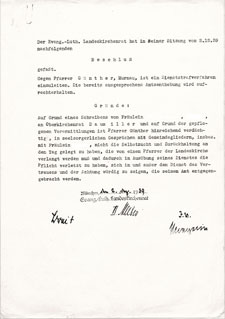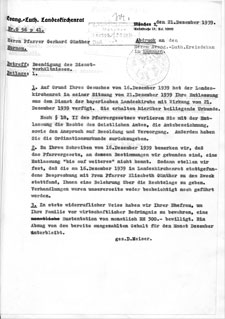Gerhard Günther: Dismissal of Opponents of Nazis
Pastor Gerhard Günther (1903–1944) had perceived the irreconcilability of the Christian church and Nazi weltanschauung early on. After studying theology at the universities in Erlangen and Leipzig, he became a candidate at the theological seminary in Nuremberg in 1926 where then-seminary director Hans Meiser (1881–1956) attested to his inclination to criticism. He became city vicar in Würzburg in 1927 before taking on a parish in Weingartsgreuth in the deanery district of Bamberg in 1929. He quickly came into serious conflicts with the local Nazis. Expecting political unrest in March of 1933, they planned to shoot their main opponent, Günther, dead in the event of bloody clashes.
He started applying for other positions as a pastor in 1934. His applications came to naught, though, because his attitude toward National Socialism raised fears of conflicts from the outset. He was not given a parish in Murnau until 1937. A rift with Nazi parishioners arose there, too, within a few months. The deputy mayor accused him – unjustly – of having included veiled attacks against the state in his inaugural sermon. Günther was denounced and interrogated by the Gestapo for circulating writings intended to make the National Socialists’ anti-church and anti-Christian policy clear to his parish. The charges before the Special Court in Munich were dropped, however, in May of 1938.
A member of the Murnau church council, which had a majority of Nazis, resigned his office in the spring of 1938 after Günther had made critical remarks about the Austrian “Anschluss”. Other church council members threatened to resign as well. They accused Günther of rejecting the “Third Reich” and making negative remarks about political issues at every opportunity. At the same time, disputes also occurred because of the religion class he taught at the girl’s high school. Günther’s ecclesiastical superiors settled the dispute with the church council and prevented further membership withdrawals. They accused Günther undiplomatic and stubborn conduct that threatened to destroy the congregation.
A confrontation with the church government also occurred in 1938. Günther refused to swear the oath of loyalty to Hitler required of Bavarian pastors by church law in May, because doing something against conscience is neither safe nor advisable (letter of June 30, 1938 to the Ingolstadt deanery, Kirche unterm Hakenkreuz, 67). Under pressure from the Reich Ministry of Church Affairs, Regional Bishop Hans Meiser distanced himself from the 2nd Provisional Church Government in the fall of 1938 because of its “liturgy of prayer on the occasion of impending war”. Günther judged this conduct to be a spiritual failure of the church’s appointed guardians, which were induced by consideration for the preservation of temporal goods time and again to be ashamed of witnessing to their Lord and those committed to him (Kirche unterm Hakenkreuz, 68).
A parishioner with whom Günther was friends and to whom he had made critical remarks about political issues denounced him to the district dean in November of 1939 for subversive propaganda and treason. The parishioner’s original intention to also inform political authorities in Berlin made the situation all the more dangerous. As a result, the church government initiated disciplinary proceedings, dismissed Günther from his job and also revoked his certificate of ordination, thus depriving him of his status as a pastor. After a stay at a sanitarium, he was assigned to work as a farmhand and counselor at a branch of the Rummelsberg Institutions near Nuremberg. At the same time, he was strongly advised to register for military service.
The church government’s measures were intended to serve to protect Günther but no less to assure the intact regional church’s survival, too. The regional consistory also tried to take pastors out of the line of fire in other cases in which pastors came into open conflict with the Nazi state. Usually, they were only transferred, though. Günther ultimately paid with his life: Drafted into the Wehrmacht in 1940 and having then taken part in the Russian campaign, he was taken prisoner of war by the Russians in 1944 and died in Tiflis prisoner of war camp on December 26, 1944. The regional consistory assigned him to Greiselbach parish in absentia in April of 1945. His death did not become known until 1949.
Source / title
- © Landeskirchliches Archiv Nürnberg, LKR 51073 (1), KrD Ansbach 5424 (2)


